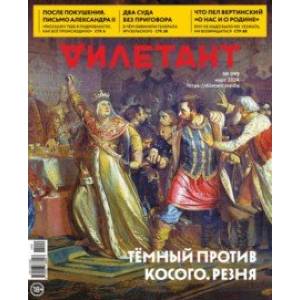Amateur. 2024. No. 099 March
Please sign in so that we can notify you about a reply
The main theme of the magazine 'Amateur' No. 099 (March 2024) - internecine strife
The succession to the throne is a powder keg. Medieval history provides dozens of examples of this. Often, the mistakes of fathers and grandfathers led to wars between their sons and grandsons. In 1389, the Grand Duke of Vladimir and Novgorod, Prince Dmitry Ivanovich Donskoy, died, leaving behind six male heirs. As a responsible ruler, he certainly made a will, but it was written in such a way that its interpretation still causes disputes. And in the 15th century, a civil war broke out in the Moscow Principality. The cause of it was this ambiguous will. After the death of his son Vasily Dmitrievich, the grandson of Donskoy, Vasily Vasilyevich, was placed on the throne. The uncle of the Grand Duke, Yuri Dmitrievich, could not tolerate this. That's when it all began...
For medieval history, a child on the throne is practically a guarantee of turmoil. There were always uncles or cousins of the underage ruler who claimed the throne. But there were also mothers who defended the rights of their sons. Such was Sophia Vitovtovna, the mother of Vasily the Dark. Disputes with brothers, sons, and even grandsons continued among the Rurikids two centuries after Vasily the Dark. The Moscow branch of the Rurikids began with Prince Daniil Aleksandrovich, the younger son of Alexander Nevsky. And it ended with Fyodor Ivanovich, the son of Ivan the Terrible.
In the regular sections:
In the 'Document', readers will learn about the 'Amazons' of Stalin. Alexey Kuznetsov will tell about Voycekh Yaruzelsky in the 'Process', and Yulia Demidenko in the 'Architecture of Power' section - about the White House. In the literary portrait gallery - Alexander Vertinsky. Readers can also expect spreads for 'See, Read, Play' and Comics, as well as a crossword puzzle and much more.
The succession to the throne is a powder keg. Medieval history provides dozens of examples of this. Often, the mistakes of fathers and grandfathers led to wars between their sons and grandsons. In 1389, the Grand Duke of Vladimir and Novgorod, Prince Dmitry Ivanovich Donskoy, died, leaving behind six male heirs. As a responsible ruler, he certainly made a will, but it was written in such a way that its interpretation still causes disputes. And in the 15th century, a civil war broke out in the Moscow Principality. The cause of it was this ambiguous will. After the death of his son Vasily Dmitrievich, the grandson of Donskoy, Vasily Vasilyevich, was placed on the throne. The uncle of the Grand Duke, Yuri Dmitrievich, could not tolerate this. That's when it all began...
For medieval history, a child on the throne is practically a guarantee of turmoil. There were always uncles or cousins of the underage ruler who claimed the throne. But there were also mothers who defended the rights of their sons. Such was Sophia Vitovtovna, the mother of Vasily the Dark. Disputes with brothers, sons, and even grandsons continued among the Rurikids two centuries after Vasily the Dark. The Moscow branch of the Rurikids began with Prince Daniil Aleksandrovich, the younger son of Alexander Nevsky. And it ended with Fyodor Ivanovich, the son of Ivan the Terrible.
In the regular sections:
In the 'Document', readers will learn about the 'Amazons' of Stalin. Alexey Kuznetsov will tell about Voycekh Yaruzelsky in the 'Process', and Yulia Demidenko in the 'Architecture of Power' section - about the White House. In the literary portrait gallery - Alexander Vertinsky. Readers can also expect spreads for 'See, Read, Play' and Comics, as well as a crossword puzzle and much more.
Cover:
Cover:soft
Category:
- Category:History & Geography
- Category:Humor & Entertainment
Dimensions:
Dimensions:27x22x.5 cm
ISBN:
ISBN:1006573
No reviews found
